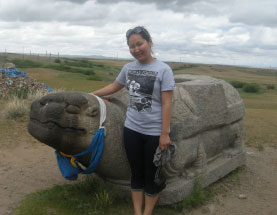 “Mongolia’s population is very small—only three million people. I know it’s possible to reach more families.”
“Mongolia’s population is very small—only three million people. I know it’s possible to reach more families.”
Family Social Science senior Delgermend “Deggi” Tserendamba is not just a pie-in-the-sky optimist. Her goals for helping families in her home country of Mongolia are as much grounded in research, study, and determination.
A participant in the University’s 2012 Undergraduate Research Opportunities Program (UROP), Tserendemba received funding to return to Mongolia during the summer of 2011 and conduct research with families. She spent two months conducting surveys with more than 200 participants across the country. Her UROP mentor is Dr. Cathy Solheim, associate professor in Family Social Science, who has worked closely with Deggi throughout the research process.
Considering the rising influence of the West in Mongolia, Tserendemba interviewed Mongolians of all ages to understand the gap between generations and investigate ways that traditional values can be passed on.
“The older generation grew up while Mongolia was communist,” she said. “Things were very homogenous, and the government took care of a lot of social needs, including child care. After communism fell in the 1990s, a lot changed. Now the younger generation is more concerned with money and status, and is facing problems like unemployment and rising alcoholism.”
Tserendamba feels that working with the younger generations in Mongolia will be the most productive way to effect change. She wants to examine the roots of the alcoholism and public intoxication that are common among young people, and give them tools to improve their lives and increase mobility.
“Nobody is asking ‘What does it mean to be Mongolian?’,” she said. “I want to create an understanding between generations to help everyone embrace Mongolian culture.”
Tserendamba will showcase her work at the annual UROP research conference in May of 2012. After her graduation in the spring, she plans on returning to Mongolia to work and be better prepared for eventual graduate work. “I want to have a good understanding of the people I want to help before I start graduate school,” she said.



